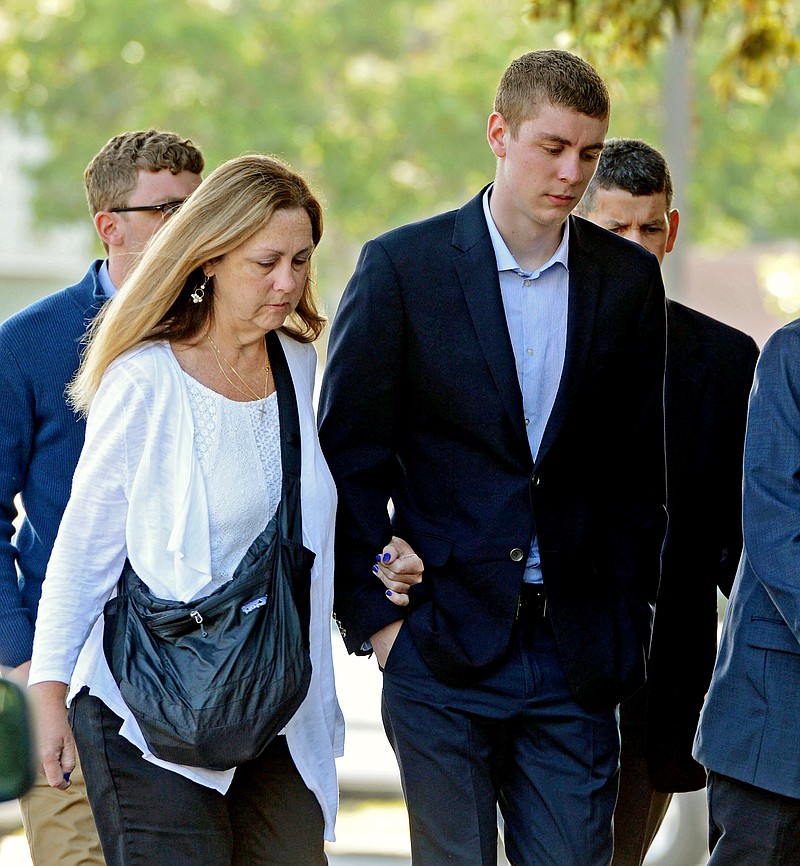SAN FRANCISCO (AP) - Gena O'Brien was catching up on headlines this week when she stumbled across a young woman's account of her life since she was sexually assaulted at Stanford University - a statement to the former student-athlete who molested her behind a dumpster 16 months ago.
O'Brien has two sons, ages 10 and 14. The older boy is a competitive swimmer, like 20-year-old Brock Turner was at Stanford before his arrest. In the raw words of an assault survivor, O'Brien recognized a teachable moment. She read portions of the woman's statement out loud to her 9th grader while he was getting ready for school and made him promise to read all 12 pages when he was done studying for finals.
"There are so many golden truths in there, stark truths," said O'Brien, a hairdresser who lives with her family in Berkeley, California. "It's about victimizing somebody and somebody's feelings of being a victim of something. And I want my boys to have empathy."
With the six-month jail sentence Turner received last week generating widespread publicity, some parents are using the case to talk with their own children about sexual misconduct, binge drinking, personal responsibility and boundaries. It's an opportunity that even comes with primary sources - the victim's statement, the plea for leniency Turner's father wrote to the sentencing judge - that are helping to fuel discussions about rape with young people who are old enough.
"Let's not kid ourselves about this. One of the reasons we are resonating with this so much is two people caught the person, it's not a 'She said, he said.' Two white men caught him," Rosalind Wiseman, the author of a book about modern boy culture called "Masterminds & Wingmen," said. "The other reason is (the victim) did an amazing job of articulating her experience."
Wiseman, a parent educator and bullying expert with two sons ages 13 and 15, said she wants her children to read the assault survivor's statement. But she also plans to engage them in a conservation about how social privilege played out in the case, how women who report rapes are often discounted, how boys and men also experience sexual violence and how difficult it can be to do the right thing, like the two Stanford graduate students who stopped Turner and held him until police arrived.
"It does them no good to talk in sound bites to our children about these kinds of issues," she said. "We have to be able to tell them they will be in situations that are really uncomfortable or messy, and it's possible people we love might do things we are not proud of. And we have to use the opportunity to ask, 'What do you think is the most important take-away from this for how you conduct yourself?"
As the father of three sons ages 9 to 13, Jeffrey Shinbrot, an attorney in Los Angeles, found in the harrowing details of Turner's behavior a way of illustrating a point he'd been trying to hammer home for a while: namely, that some of hip-hop lyrics his boys mindlessly sang normalized misogynistic behavior he considered neither normal nor cool.
"I said, 'Look you guys, this is how serious the things you are repeating in music are. I really wanted them to understand the seriousness of those types of acts and the seriousness of the acts the lyrics are describing," Shinbrot said. "Did it sink in? Who knows."
Margaret Silverman of Orinda, California has an 18-year-old son heading off to college in the fall. She remembers speaking with him when he was a high school freshman about communicating well with his future sexual partners, about respecting that both he and the girls he was interested in had the right to say no.
While touring the university where her son will be in September, the two of them heard about a campus fraternity that had been suspended after police broke up a party and found a woman passed out on a couch. Silverman told him she hoped he would be the one to notice, to pay attention rather than ignore, if he found himself in a situation like that, a message she plans to deliver again.
"I'll be reminding him, 'If you see a buddy of yours acting out, I would hope you would have the sensibility to say, Hey dude, leave her alone, let's get out of here.'"
